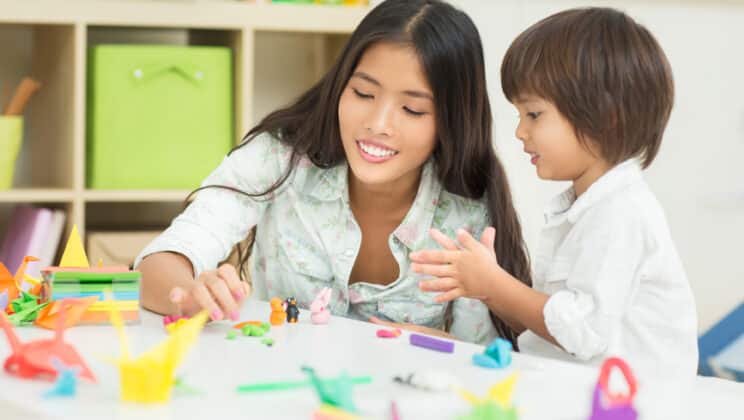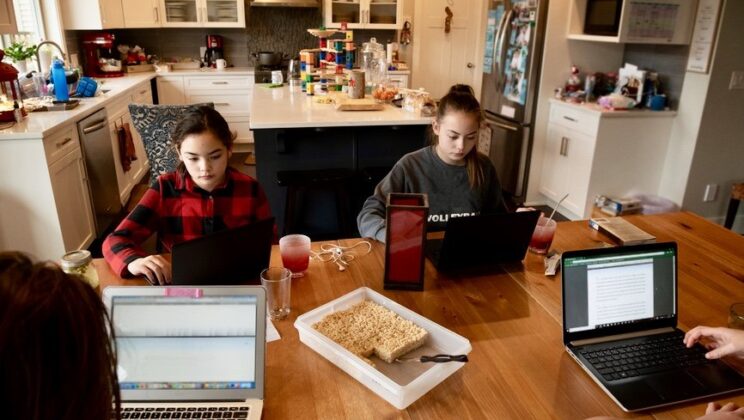How to Support Your Kids in the Age of Coronavirus: 7 Therapist-Approved Tips
March 20, 2020
The coronavirus pandemic has upended life for people worldwide, and grappling with so much change, fear, and uncertainty is difficult for everyone. With schools shuttered, directives to work from home, restaurant and store closures, shelter-in-place orders, and shortages of everyday essentials from milk to toilet paper, we’re all feeling more stress.
Kids are feeling the stress, too. Their daily schedule has been turned upside down, they can’t play or hang out with friends, and their parents may be more distracted than usual as they try to balance caring for children with working from home. Despite these new challenges, there are effective ways to help support your children through this scary and stressful time. Here are seven expert tips.
1. Stick to a schedule.
We all need a schedule to keep us on track, and kids are no exception. Children feel emotionally safe and more secure when there are rules in place and a schedule to follow. Set specific times of the day aside for activities like academic work, play, meals, arts and crafts, reading, and family togetherness.
2. Take care of yourself so you can be there for your kids.
The old adage about putting the oxygen mask on yourself before helping others really is true. If you’re not in good shape, it will be even tougher for you to support your children. Now is not the time to panic, though admittedly, staying calm can be easier said than done. Keep in mind that if your children see you stressed and upset, they are more likely to feel anxious themselves.
Do what you need to do to maintain your own sanity and well-being, whether that means taking a walk, practicing mindfulness meditation, or talking with your partner or friends (in private) about your fears. Prioritizing self-care activities like these is not only essential for your own health, it’s also important to the people who depend on you.
3. Be open, validating and reassuring.
Some kids may talk a lot about COVID-19 and others may stay quiet. Create opportunities to talk with your children about what they may be reading in the news or hearing from friends. Be sure to validate whatever feelings they may be having. If they’re feeling happy about being off from school, refrain from scolding them–these feelings are normal. If they’re feeling sad and lonely, tell them you understand and that anyone would be feeling a little sad or lonely and missing their friends right now. If they’re worried about their health or yours, let them know that it’s normal to feel anxious right now, but reassure them that everything will be ok.
4. Talk to kids in a developmentally appropriate way.
The novel coronavirus outbreak is a global pandemic and will dominate the news and conversations for quite some time. Limit your kids’ exposure to media stories and your own fears, as valid as they may be, and answer kids’ questions in a way that will make sense to them, using age-appropriate language. Remember you may need to explain basic concepts like what a virus is, how it spreads, or why we wash our hands. However, there’s no need to alarm children by sharing too many scary details.
Try not to evade tough questions, but rather to answer them in a way that reassures kids they will be ok. Yes, some people have died, but the risk of dying from COVID-19 is very low, particularly if we take reasonable precautions and good care of ourselves. or discussing the COVID-19 mortality rate with them. Children (and adults) sometimes have irrational worries, so help kids to sort fact from fiction. For example, be mindful that children may have an irrational worry that if they are bad, they’ll get sick. You can provide your kids with a sense of safety and security by reminding them that you’re here to love and take care of them and will continue to do so.
5. Help your kids manage feelings of stress.
You might start by teaching them a couple of breathing exercises such as square breathing or counting their breath. One fun way to help younger children to practice mindful breathing is to let them blow bubbles. If their breath is too rapid or shallow, the bubbles will pop or won’t form. Another exercise you can use to teach children deep breathing is to have them lie down with a piece of paper on their diaphram. As they inhale, they watch the paper rise; as they exhale, they watch it fall.
Help your younger children express their feelings by writing letters or sending drawings to the school friends they miss or family members they’re unable to see. Creating cards, letters, and pictures for loved ones can be a fun and engaging activity that helps children release and work through feelings of worry.
If you have teenagers, help them focus on positive, future-oriented activities by identifying things they can look forward to once they can spend time with their peer group again. Remember that socialization is an important part of adolescent mental health. If your teens aren’t already, encourage them to video chat with friends, especially if concerns about the coronavirus are causing them to miss out on important social milestones such as senior trips, prom, or graduation. Exercise can be a great stress reliever, too. Go for a walk with your children, teach them some yoga poses, or have a pillow fight–anything that gets you moving can be a terrific mood booster.
6. Use distraction vs. avoidance.
Try using distraction strategies if it seems like your child is stuck in a worry. Remember, though: Distraction isn’t the same as avoidance. Efforts to avoid worries (for example, telling a worried child to stop worrying) only strengthen worry thoughts. Have you ever tried to stop thinking about a pink elephant? All you do is think about a pink elephant.
Distraction, on the other hand, is an approach that acknowledges, “I know you’re worried right now, but let’s give your mind a vacation from those thoughts and focus on something else for a while.” That could mean playing a game together, listening to some music, or watching a show on streaming media.
7. Consider professional support.
Is your child constantly worried about COVID-19 to the point where it’s affecting their ability to concentrate? Are they feeling so sad or lonely that they’ve stopped engaging with you, or are having trouble sleeping or eating? These may be signs that your child would benefit from seeing a therapist. You’re the expert when it comes to your child. If you feel they need extra support, don’t hesitate to contact a behavioral health care provider through your health care plan or employee assistance program (EAP).
If your employer offers Lyra and you’re looking for support, we’re here for you. Sign up today and we’ll connect you to a behavioral health solution that is right for your needs.
Remember that you are the most important person in your child’s life. With your support, they can weather this storm and come out on the other side with some new skills for managing stressful emotions that will benefit them throughout their lives.
CONTACT US
If you're an employer and would like to learn more about how Lyra’s enhanced EAP addresses network adequacy and quality issues, download our whitepaper on quality or get in touch.
And check in frequently here or follow us on Facebook, LinkedIn, and Twitter for more insights into supporting employees’ mental health.
DISCLAIMER
The content of this blog is not intended to be a substitute for professional medical advice, diagnosis, or treatment.
ABOUT THE AUTHOR
Renee Schneider, PhD is the VP of Clinical Quality at Lyra Health and a licensed clinical psychologist. She has extensive experience and skill in the areas of crisis management, psychological assessment, clinical supervision and intervention, and empirical research. Dr. Schneider also specializes in supporting children and families.
Explore additional blogs

Youth mental health
Building a Village for Family Mental Health Care

Youth mental health
4 Things You Should Know About Adolescent Mental Health

Youth mental health